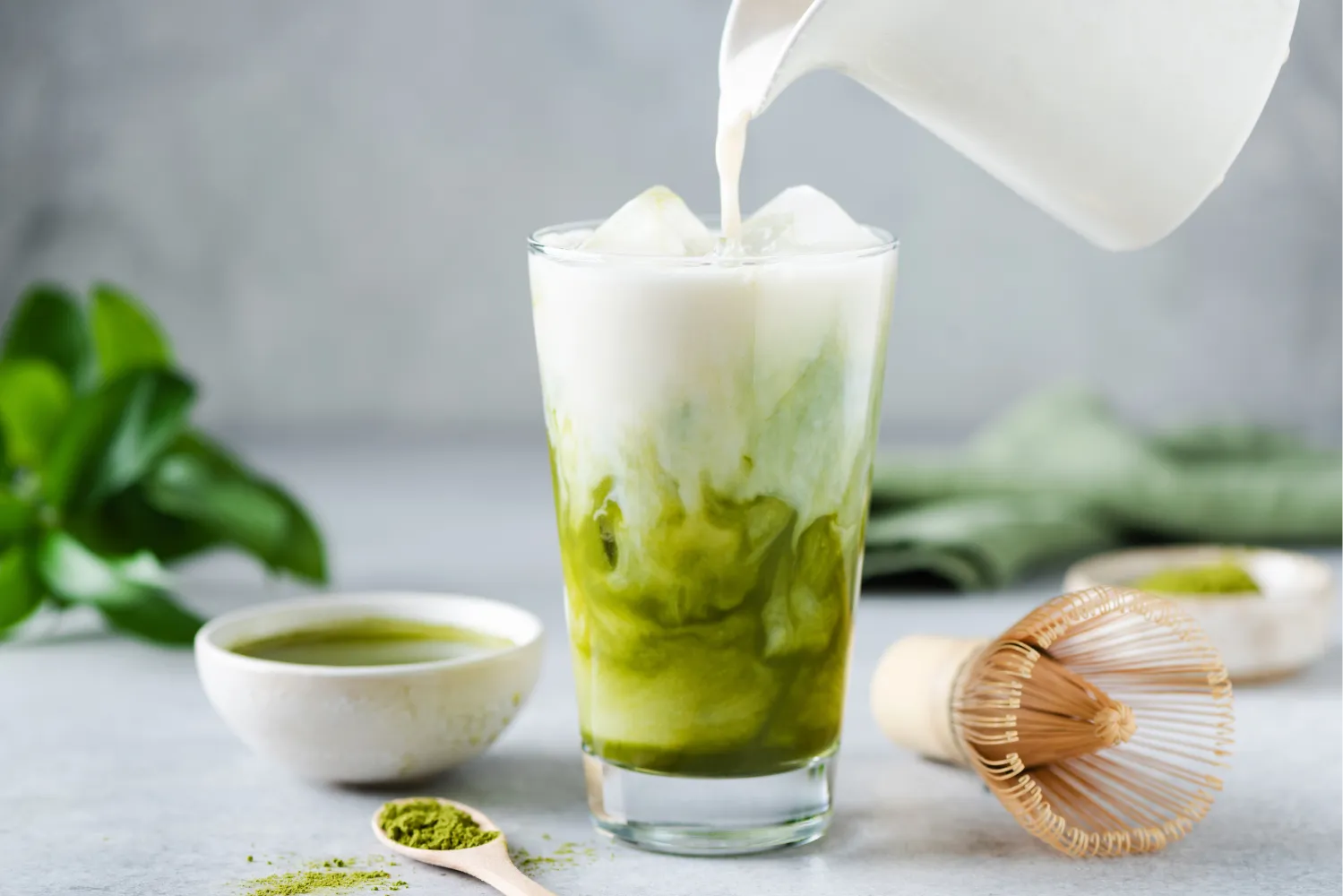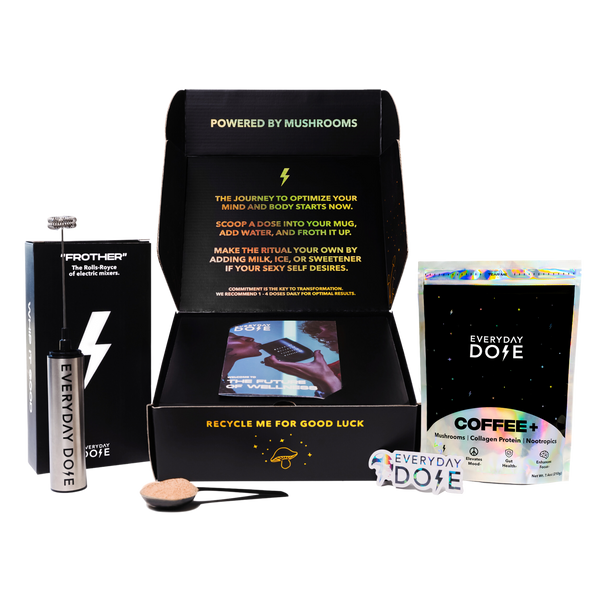Matcha vs. Coffee: Which Has More Caffeine?

Ah, sweet caffeine. If you need a dose or two of caffeine to make it through the day, you’re not alone — 64 percent of Americans drink at least one cup of coffee every day.
However, coffee isn’t the only morning cuppa that packs a ton of caffeine. Matcha is another earthy drink that has a comparable amount of caffeine. Read on to learn the differences between these two drinks, which has more caffeine, and whether there’s really such a thing as too much caffeine.
What Is Matcha Made From?
Matcha is a powdered green tea made from the leaves of the Camellia sinensis plant, also called the tea plant. This plant is mainly cultivated throughout China, India, Thailand, and Japan, although it can technically grow anywhere in the world if the conditions are right.
Matcha might be made from green tea, but there are a few key differences. First, matcha plants are grown solely in the shade to keep their L-theanine and chlorophyll contents high.
Second, matcha is made by mixing hot water with ground tea leaves, rather than simply steeping them. This results in a mixture that is much more concentrated and much more powerful. Third, matcha is only made from the youngest leaves on the tea plant, which adds to the tea’s characteristic sweetness.
What Is Coffee Made From?
Many of us know coffee as the warm, life-giving elixir that steams in our mugs each morning. However, coffee doesn’t just spawn at the coffee shop on the corner — it literally grows on trees.
Coffee is made from coffee beans, which technically grow on any plant in the Coffea genus. However, coffee as we know it is made using two main species: Coffea arabica and Coffea canephora.
These plants grow best in tropical climates, and most of the coffee you drink is probably grown specifically in a strip next to the equator known as “the Coffee Belt.” This area goes through parts of Africa, Asia, the Middle East, and Central and South America.
Matcha vs. Coffee Which Has More Caffeine?
So, we’ve reached the final showdown: Which one of these warm drinks has more caffeine? While both drinks are rich in antioxidants and can offer numerous health benefits, coffee still has more caffeine on average than matcha does.
One cup of matcha contains about 70 mg of caffeine, while coffee can contain 100 to 120 mg of caffeine per cup. The difference is noticeable.
Is this a good thing, or should we be wary of how much caffeine is in these drinks? This brings us to our next question.
Can You Have Too Much Caffeine?
It is absolutely possible to have too much caffeine. In fact, most people have experienced caffeine overdose at some point. Those jitters, anxious feelings, heart palpitations, and nervous sweats aren’t normal — they can come from too much caffeine activating your sympathetic nervous system.
Most experts will say the upper limit of your daily caffeine intake should be around 400 mg of caffeine. However, the reality is much more nuanced.
Essentially, it all comes down to the CYP1A2 gene. You have two copies of this gene, one from each of your parents. Among other things, this gene controls your caffeine metabolism.
If you have two “fast” versions of this gene, you’d probably feel nothing if you drank a pot of coffee on your way out the door. If you have two “slow” versions of this gene, you probably can’t drink more than a cup before you feel the caffeine jitters set in.
The point is that everyone is unique, and 400 mg of caffeine may be far too much for someone who is slow to metabolize it. Instead, pay attention to how you feel after each sip of coffee, and learn to recognize your body’s ways of telling you when it’s had enough.
How Can You Manage Caffeine Jitters?
Although we try our best, we all slip up sometimes. What happens if you accidentally drink too much coffee or matcha and get the caffeine jitters? Here are some things you can do to support relaxation.
Limit Caffeine Intake
One of the most obvious paths you can take is to limit your caffeine intake from the get-go. This is especially true if you have a lower caffeine tolerance than most.
You don’t need to completely cut caffeine out of your life. Instead, think about making a cup of half-caf coffee or choosing a functional coffee with lower levels of caffeine. For instance, Everyday Dose Mushroom Coffee+ contains only 40 mg of caffeine. This amount is functional enough to help you feel the refreshing benefits of a cup of coffee without contributing to jitters.
Take L-Theanine
L-theanine is one of the amino acids that can be found in the tea plant. Not only can this compound support feelings of relaxation, mental health, and mental performance, but it can also help mitigate the unpleasant effects of caffeine.
If you have a hard time drinking coffee without feeling a little woozy, you may want to try swapping it out for a cup of matcha. Matcha naturally contains concentrated amounts of L-theanine, and our Mushroom Matcha+ blend supplements that with extra L-theanine to boot.
Get Some Exercise
If the jitters have already hit, there’s not much you can do except wait them out and try again next time. Caffeine overdose isn’t like having one too many drinks at the bar — there’s no way to “sober up.”
One thing you can do to help make the metabolism process a little easier is get some exercise. Aerobic exercise like running, swimming, or dancing can help take your mind off of the anxiety and give you an outlet for all of your adrenaline.
Practice Mindfulness
Finally, you might want to try some mindfulness meditation to restore a sense of calm. Find a calm and quiet place and slow your thoughts as much as possible. Focus on the sensations around you — what do you touch, feel, hear, smell, and taste?
Pay attention to these things, and acknowledge the thoughts as they cross your mind. Don’t try to clear your mind, but simply increase your awareness of how you are feeling.
The Final Word
Matcha and coffee are both caffeinated beverages that are quite popular at cafes and in-home breakfast nooks. While they can both have health benefits and have comparable caffeine content, coffee undeniably has more caffeine than matcha.
However, it’s easy to overdo it on caffeine, especially if you don’t take your unique caffeine metabolism into consideration. If you’re looking to cut back on caffeine but don’t want to sacrifice the taste of your morning cuppa, try one of our functional mushroom blends today.
Sources:
94% of us Drink Caffeinated Beverages | Sleep Foundation
The Important Health Benefits Of Matcha Tea | Piedmont Healthcare
Caffeine: How much is too much? | Mayo Clinic
L-theanine partially counteracts caffeine-induced sleep disturbances in rats | PMC
Mindfulness meditation: A research-proven way to reduce stress | American Psychological Association








